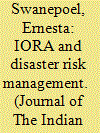|
|
|
Sort Order |
|
|
|
Items / Page
|
|
|
|
|
|
|
| Srl | Item |
| 1 |
ID:
132054


|
|
|
|
|
| Publication |
2014.
|
| Summary/Abstract |
Natural disasters have become a heightened security issue in the last decade. Mitigating and responding to disasters, such as the 2004 tsunami in Southeast Asia and the 2011 earthquake in Japan, reflect a new security agenda that has spread across the globe and infiltrated most regional organizations. At first glance, the creation of regional programmes on disaster risk management (DRM) appears to be driven by the functional preferences of states. However, a comparison of ten regional organizations reveals some curious ambiguities. Despite different threat perceptions, financial budgets and geographical environments of regional organizations, a majority of states have formed DRM programmes that exhibit highly standardized features in terms of language, the referent points of protection and the apparent motivations for cooperation. World society theory is used to explain these striking similarities with reference to the global cultural system. This article also illustrates the analytical purchase of world society theory in understanding cooperation through regional organizations.
|
|
|
|
|
|
|
|
|
|
|
|
|
|
|
|
| 2 |
ID:
160254


|
|
|
| 3 |
ID:
170840


|
|
|
|
|
| Summary/Abstract |
Cultural heritage is about people. About the ones who built monuments and created art hundreds of years ago, and about the ones who identified with them today. It is identity for the locals and discovery for the foreigners. Cultural heritage moves tourism, local and national economies, and knowledge sharing. It helps to strengthen social inclusion, and resilient recovery after a crisis. However, it is facing a future of increasing risk. The impact of climate change on cultural heritage, both tangible and intangible, is a reality happening in many countries all around the world. From the effects of rising sea levels, to increasing storms and drought, a series of cultural heritage assets are under imminent threat. This paper will review the current situation of this matter, including examples of cultural heritage threatened by climate change worldwide, and will analyze potential solutions such as the integration of heritage into the disaster risk management discipline, as well as the role of culture and traditions in understanding and communicating disaster risk and climate change action, to strengthening resilience in local communities.
|
|
|
|
|
|
|
|
|
|
|
|
|
|
|
|
| 4 |
ID:
164712


|
|
|
|
|
| Summary/Abstract |
In the Philippines, calls for creating ‘global’, ‘sustainable’ and ‘resilient’ cities are placing urban poor communities in increasingly precarious positions. These communities have long been the targets of urban development and ‘modernisation’ efforts; more recently the erasure of informal settlements from Philippine cities is being bolstered at the behest of climate change adaptation and disaster risk management (DRM) agendas. In Metro Cebu, flood management has been at the heart of DRM and broader urban development discussions, and is serving as justification for the demolition and displacement of informal settler communities in areas classed as ‘danger zones’. Using Kusno's (2010) interpretation of the ‘exemplary centre’ as a point of departure, this paper interrogates the relationship between DRM, worlding aspirations (Roy and Ong, 2011) and market‐oriented urbanisation in Cebu, and considers the socio‐spatial implications of these intersecting processes for urban poor communities. Through analysing the contradictions inherent in framings of certain bodies and spaces as being ‘of risk’ or ‘at risk’ over others, I argue that the epistemologies of modernity, disaster risk and resilience endorsed and propagated by the state are facilitating processes of displacement and dispossession that serve elite commercial interests under the auspices of disaster resilience and pro‐poor development.
|
|
|
|
|
|
|
|
|
|
|
|
|
|
|
|
|
|
|
|
|